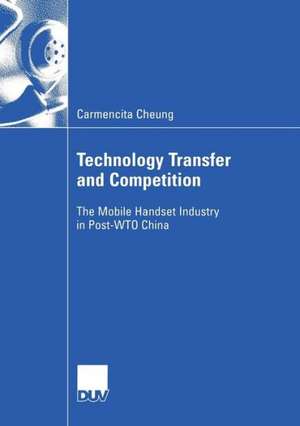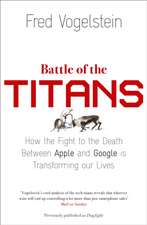Technology Transfer and Competition: The Mobile Handset Industry in Post-WTO China: Wirtschaftswissenschaften
Autor Carmencita Cheung Cuvânt înainte de Prof. Dr. Wolf Reitspergeren Limba Engleză Paperback – 28 apr 2005
Din seria Wirtschaftswissenschaften
- 15%
 Preț: 441.51 lei
Preț: 441.51 lei - 15%
 Preț: 467.28 lei
Preț: 467.28 lei -
 Preț: 445.33 lei
Preț: 445.33 lei - 15%
 Preț: 469.91 lei
Preț: 469.91 lei -
 Preț: 447.41 lei
Preț: 447.41 lei - 15%
 Preț: 641.03 lei
Preț: 641.03 lei - 15%
 Preț: 439.56 lei
Preț: 439.56 lei -
 Preț: 489.30 lei
Preț: 489.30 lei - 15%
 Preț: 439.56 lei
Preț: 439.56 lei - 15%
 Preț: 468.12 lei
Preț: 468.12 lei - 15%
 Preț: 436.28 lei
Preț: 436.28 lei - 15%
 Preț: 442.82 lei
Preț: 442.82 lei - 15%
 Preț: 584.58 lei
Preț: 584.58 lei - 15%
 Preț: 469.74 lei
Preț: 469.74 lei - 15%
 Preț: 471.53 lei
Preț: 471.53 lei - 15%
 Preț: 472.36 lei
Preț: 472.36 lei - 15%
 Preț: 637.78 lei
Preț: 637.78 lei -
 Preț: 487.37 lei
Preț: 487.37 lei -
 Preț: 360.15 lei
Preț: 360.15 lei - 15%
 Preț: 469.41 lei
Preț: 469.41 lei - 15%
 Preț: 525.99 lei
Preț: 525.99 lei - 15%
 Preț: 468.76 lei
Preț: 468.76 lei - 15%
 Preț: 444.14 lei
Preț: 444.14 lei -
 Preț: 488.71 lei
Preț: 488.71 lei - 15%
 Preț: 473.34 lei
Preț: 473.34 lei - 15%
 Preț: 468.12 lei
Preț: 468.12 lei -
 Preț: 416.54 lei
Preț: 416.54 lei - 15%
 Preț: 437.58 lei
Preț: 437.58 lei - 15%
 Preț: 525.85 lei
Preț: 525.85 lei - 15%
 Preț: 538.10 lei
Preț: 538.10 lei - 15%
 Preț: 445.76 lei
Preț: 445.76 lei -
 Preț: 455.30 lei
Preț: 455.30 lei -
 Preț: 450.11 lei
Preț: 450.11 lei -
 Preț: 455.89 lei
Preț: 455.89 lei -
 Preț: 490.07 lei
Preț: 490.07 lei -
 Preț: 450.33 lei
Preț: 450.33 lei - 15%
 Preț: 446.41 lei
Preț: 446.41 lei -
 Preț: 417.90 lei
Preț: 417.90 lei - 15%
 Preț: 489.95 lei
Preț: 489.95 lei -
 Preț: 478.53 lei
Preț: 478.53 lei -
 Preț: 355.52 lei
Preț: 355.52 lei -
 Preț: 484.69 lei
Preț: 484.69 lei - 20%
 Preț: 588.21 lei
Preț: 588.21 lei -
 Preț: 415.77 lei
Preț: 415.77 lei - 15%
 Preț: 529.28 lei
Preț: 529.28 lei -
 Preț: 451.26 lei
Preț: 451.26 lei -
 Preț: 343.59 lei
Preț: 343.59 lei - 15%
 Preț: 440.21 lei
Preț: 440.21 lei - 15%
 Preț: 437.12 lei
Preț: 437.12 lei
Preț: 644.30 lei
Preț vechi: 758.01 lei
-15% Nou
Puncte Express: 966
Preț estimativ în valută:
123.30€ • 128.25$ • 101.79£
123.30€ • 128.25$ • 101.79£
Carte tipărită la comandă
Livrare economică 12-26 aprilie
Preluare comenzi: 021 569.72.76
Specificații
ISBN-13: 9783824408344
ISBN-10: 3824408341
Pagini: 543
Ilustrații: XXVIII, 372 p. 37 illus.
Dimensiuni: 148 x 210 x 22 mm
Greutate: 0.53 kg
Ediția:2005
Editura: Deutscher Universitätsverlag
Colecția Deutscher Universitätsverlag
Seria Wirtschaftswissenschaften
Locul publicării:Wiesbaden, Germany
ISBN-10: 3824408341
Pagini: 543
Ilustrații: XXVIII, 372 p. 37 illus.
Dimensiuni: 148 x 210 x 22 mm
Greutate: 0.53 kg
Ediția:2005
Editura: Deutscher Universitätsverlag
Colecția Deutscher Universitätsverlag
Seria Wirtschaftswissenschaften
Locul publicării:Wiesbaden, Germany
Public țintă
ResearchCuprins
1 Overview.- 2 An Integrative Analytical Framework.- 2.1 Introduction.- 2.2 Discussion of the model.- 2.3 Did China “force” technology transfer from foreign investors?.- 2.4 Conclusions.- 3 China’s ICT Aspirations and Frustrations.- 3.1 Introduction.- 3.2 Discussions.- 3.3 Conclusions.- 4 Hypotheses Formulation.- 4.1 Introduction.- 4.2 China’s WTO concessions.- 4.3 Formulating Hypothesis 1.- 4.4 Formulating Hypothesis 2.- 4.5 Formulating Hypothesis 3.- 4.6 Conclusions.- 5 Methodology: Objective, Design and Data Collection.- 5.1 Introduction.- 5.2 Establishing an industry focus.- 5.3 Choosing a method for the empirical investigation.- 5.4 Collecting and analyzing primary data.- 5.5 Presenting the data.- 6 Profile of Participating Companies.- 6.1 Introduction.- 6.2 Profile of interviewed MTEFs.- 6.3 Adjacent industry players interviewed.- 6.4 Conclusions.- 7 Multinationals’ Technology Transfer Activities in pre-WTO China.- 7.1 Introduction.- 7.2 The economics of technology transfer.- 7.3 Technology transfer as a continuum.- 7.4 Gearing up for WTO accession.- 7.5 Conclusions.- 8 Assessing Hypothesis 1.- 8.1 Introduction.- 8.2 Findings.- 8.3 Conclusions.- 9 Assessing Hypothesis 2.- 9.1 Introduction.- 9.2 Findings.- 9.3 Conclusions.- 10 Assessing Hypothesis 3.- 10.1 Introduction.- 10.2 Findings.- 10.3 Conclusions.- 10.4 “Win-win” is more affordable than “win-lose” in the long run.- 11 “Win-Win” is No Platitude.- 11.1 Introduction.- 11.2 Conditions that favour cooperation.- 11.3 Crafting win-win strategies.- 12 Conclusions and Discussion of Emerging Trends.- 12.1 Summary.- 12.2 Applying the integrative model.- 12.3 Limitations of this study.- 12.4 Looking ahead.- Postscript.
Notă biografică
Dr. Carmencita Cheung promovierte bei Prof. Dr. Wolf D. Reitsperger am Arbeitsbereich für Internationales Management der Universität Hamburg.
Textul de pe ultima copertă
Is technology transfer by foreign investors merely acquiescence to Chinese ambitions in exchange for short term market access? Will helping potential Chinese rivals hasten the transferor's own demise? Will foreign investors cease transferring technology to Chinese firms once they are relieved of these obligations by China's implementing TRIPs (Agreement on Trade Related Aspects of Intellectual Property) and TRIMs (Agreement on Trade Related Investment Measures) in the post-WTO era?
Carmencita Cheung examines these questions by introducing an integrative analytical framework built on the economics of multinational firms, industry analysis and state-firm relationships. The results of the author's interviews with the senior management of some of the world's top handset producers show that, in addition to changes brought about by China's WTO accession, the concurrence of industry evolution and generational migration plays a key role in shaping technology transfer decisions. The findings also shed light on China's technology policy and its concerted efforts to set technical standards in the global information and communication technology industry.
Carmencita Cheung examines these questions by introducing an integrative analytical framework built on the economics of multinational firms, industry analysis and state-firm relationships. The results of the author's interviews with the senior management of some of the world's top handset producers show that, in addition to changes brought about by China's WTO accession, the concurrence of industry evolution and generational migration plays a key role in shaping technology transfer decisions. The findings also shed light on China's technology policy and its concerted efforts to set technical standards in the global information and communication technology industry.
Caracteristici
China's aspirations in the global information and communications technology industry








